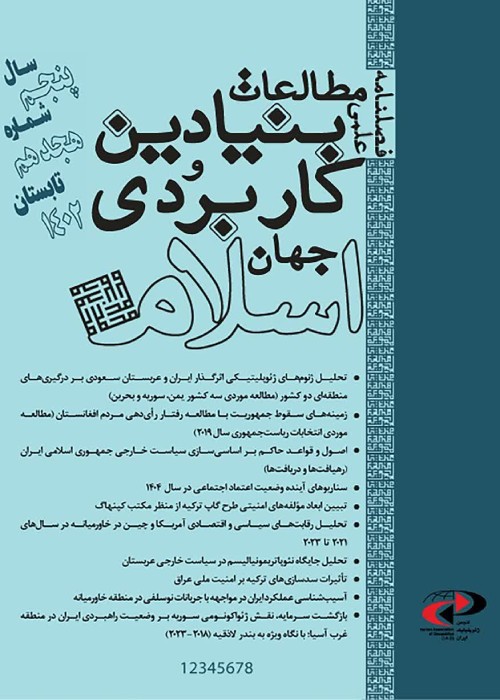Investigating and explaining the effective identity factors in the formation of recent developments in the Arab Middle East (case study: Kurds, Shiites, and fundamentalists)
In Syria and Yemen, the apparent power of ethnic and religious groups has led to civil war, rooted in the identity issues of these societies. Under the consensus cultural variable is the component of identity, which is one of the main factors and the foundation of the so-called Arab Spring developments. The majority of Arab societies suffer from the lack of national identity due to the plurality of ethnic and religious groups, which puts some groups in a superior political position and pushes others to the margins. Identity is at the top of the Arab developments, and other factors are placed below it. Even the difference in the process of developments in these societies is due to the identity issue. The aim of this research is to investigate the role of identity in the formation, results, and trends of recent developments in the Arab Middle East using constructivism in a descriptive and analytical way. The article's main question is, "What effect has the identity and identitarianism of ethnic and religious groups of Arab societies had on the formation and process of recent developments of these societies?" The findings indicate that the social structure of most Arab societies is very plural. Muslim groups in Arab countries are not cohesive, and there are many religious sects that fuel the religious divide of these societies. The biggest gap is between Shia and Sunni. The difference in the fundamentals of the belief principles of the various Sunni sects has led to their identity split. The Brotherhood, Salafism, and radical fundamentalism are the most effective identity discourses of the Sunni sect, which, along with the Shiites, try to spread their intellectual values and norms in Arab societies. The most prominent ethnic divide is related to the Kurdish ethnicity, which in countries such as Syria and Iraq pursue a different identity from the Arab ethnic groups due to their cultural values. Due to the lack of common norms in Arab societies, a common identity has not been formed in these countries, and we are facing a plurality of identities that are rooted in contradictions and conflicts. This is why during the Arab developments, three groups of fundamentalists, Shiites, and Kurds have become highly active in the analysis of identity action, and it is not possible to solve the crises of these societies without considering their demands.
When the political units do not pay attention to the intellectual, perceptive, normative, and identity components of the citizens, it is natural that conflicts between the government and the society will be created. This is what has been objectified in the Arab societies of the Middle East. The Arab totalitarian governments, by creating a fence around themselves, have actually limited the political and economic structure to their families and those around them and do not care about other peoples.
Therefore, what was formed in the Arab Middle East in 2011 cannot be unrelated to the ethnic-religious intellectual and normative patterns of this region. Even the trends and differences in the developments of Arab societies are not unrelated to the plural identity of these societies. The more cohesive the country is in terms of social structure, the faster the social movement ends, and we do not witness civil war or the presence of other countries in the course of the developments of these societies. A clear example of that is Egypt and Tunisia, where the overthrow of the governments resulted in relative peace in a short period of time. The lack of active ethnic-religious identities and their relatively coherent social structure caused the shortness of the transition period, low violence, and non-intervention of other countries in the course of the developments of these societies. However, identity pluralism in some societies such as Syria, Yemen, and to some extent Libya pushed the developments in another direction. In these societies, the depth of the identity difference is such that none of the parties backed down from their position, and the protests progressed towards civil war and widespread crisis. The identity and ideological war stemming from dry religious interpretations led to widespread violence in societies such as Syria, Iraq, and Yemen. The presence of active identity groups in the developments of these societies followed the reaction of transnational actors in the field of supporting identity groups close to them, which ultimately results in the prolongation of the crisis and proxy wars.
- حق عضویت دریافتی صرف حمایت از نشریات عضو و نگهداری، تکمیل و توسعه مگیران میشود.
- پرداخت حق اشتراک و دانلود مقالات اجازه بازنشر آن در سایر رسانههای چاپی و دیجیتال را به کاربر نمیدهد.


